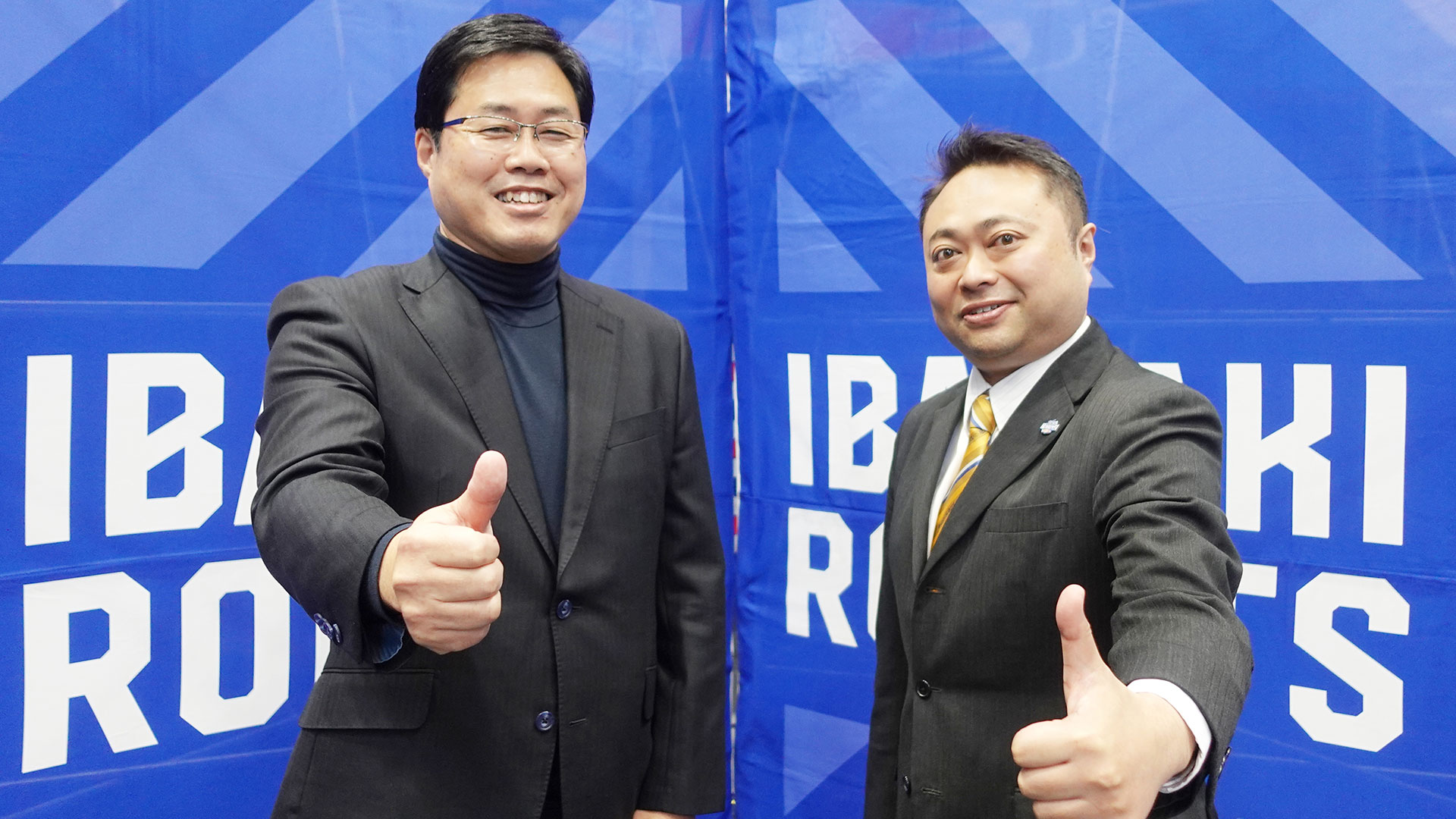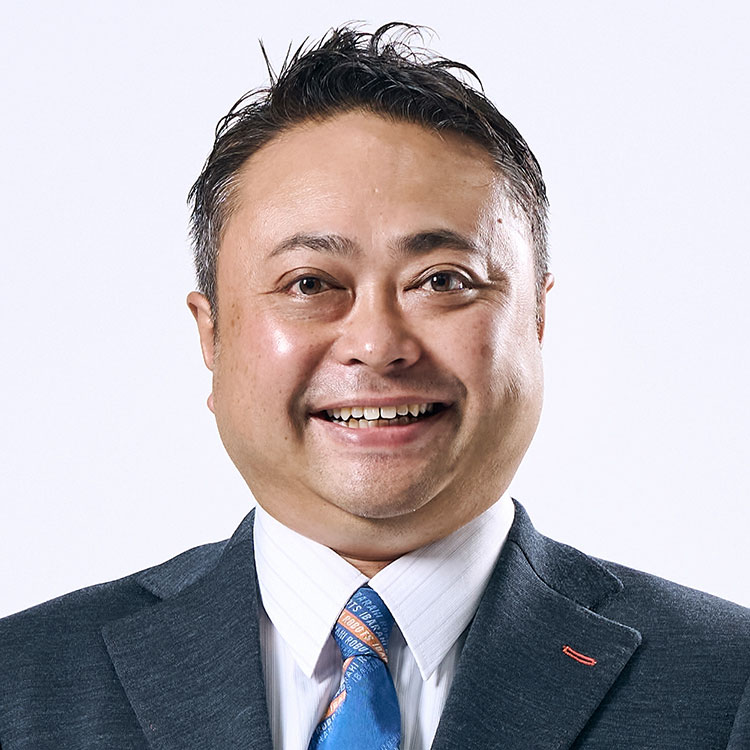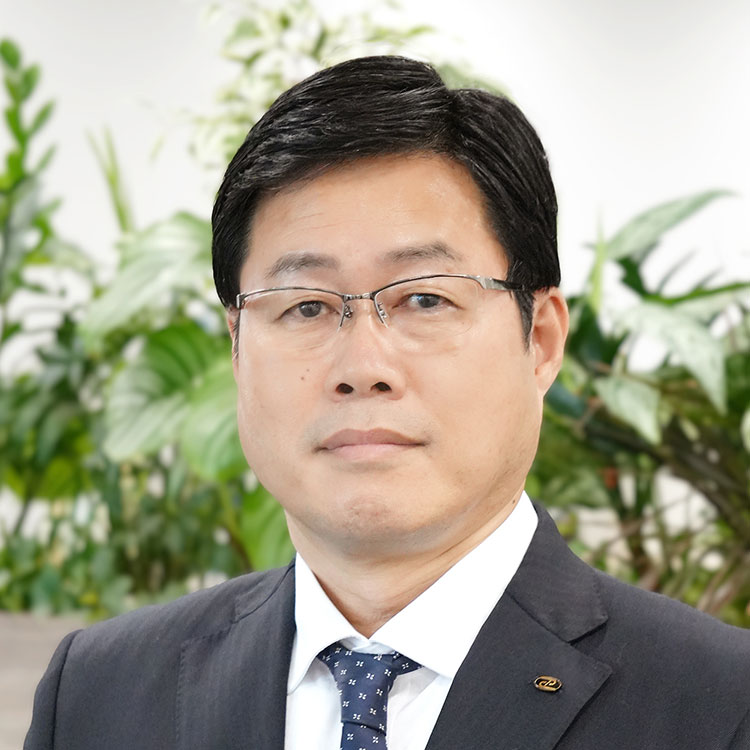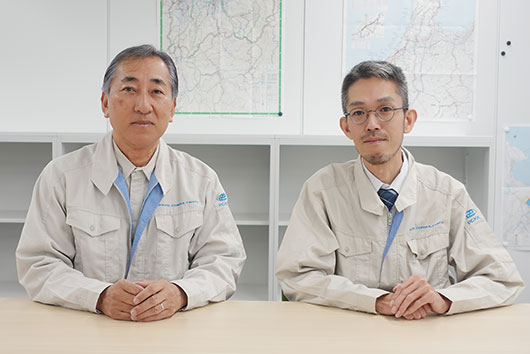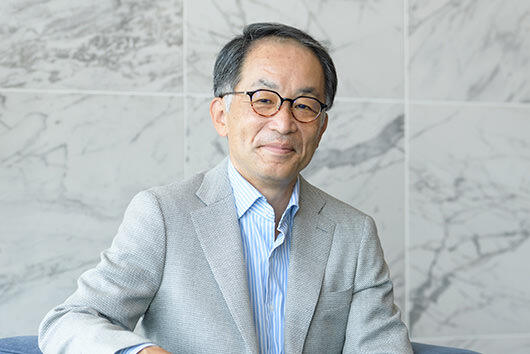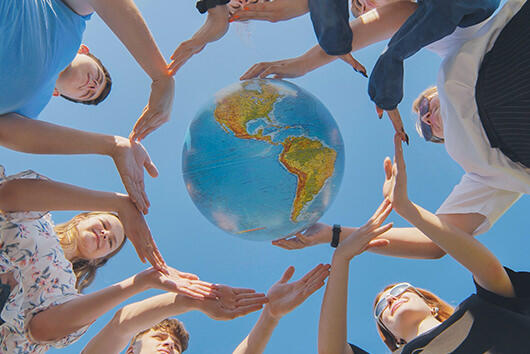PACIFIC CONSULTANTS, as an official sponsor of the professional basketball team "Ibaraki Robots," is promoting community contribution activities through the Tsukuba Research Center. Atsushi KAWASAKI, President and Representative Director of Ibaraki Robots Sport Entertainment, leading the Ibaraki Robots, and Makoto ICHIYAMA, Director of the Tsukuba Research Center, talked about their efforts to date and future developments.
INDEX
- Obtained B.League Premier license
- There is much to learn from teamwork
- Becoming a force that connects people, towns, and business operators
- I want to proudly say, "I'm from Ibaraki"
Obtained B.League Premier license
--Please tell us about the Ibaraki Robots' profile.
KAWASAKI: The Ibaraki Robots are a professional basketball team that belongs to the B.League (B1) and were founded in July 2013. At the time, they were based in Tsukuba City and joined the NBL (Japan League Division 1) under the team name "Tsukuba Robots". However, the following year the management company went bankrupt and the team came under the management of the NBL. After that, under a new management company, they moved to Mito City and changed their name to "Ibaraki Robots" to coincide with the start of the B.League in September 2016, and entered B2 as a professional basketball team in Ibaraki Prefecture, with their hometowns centered around Mito City and Tsukuba City. They were then promoted to Division 1 in May 2021 and are currently playing their fourth season in Division 1.
--You have obtained a license for B.LEAGUE PREMIER, which will start in 2026.
KAWASAKI: We will be issued a license in December 2024 as we have met the requirements for the fourth round of auditions, and will officially become one of the 26 teams in the top category of Japanese professional basketball.
-Why is the league changing to B Premier?
KAWASAKI: Previously, the B.League had B1, B2, and B3, and teams were replaced based on their performance each year. However, the B.League's reform, "B. Innovation," will create a league with no promotion or relegation, called B.PREMIER (hereinafter referred to as B.Premier), which aims to be the highest level in Japan and only clubs that meet certain standards can enter. However, the standards are by no means lenient, and include annual sales of 1.2 billion yen or more, average attendance of 4,000 people or more, capacity of 5,000 seats or more, and an arena that meets the standards of having suite rooms. In other words, it is not simply about how the team performed that season, but about whether the team has a stable management and business foundation and can contribute to the local community, and I also believe that this is an important reform for the future development of the B.League.
ICHIYAMA: So as a local professional team, we have to contribute to the community.
KAWASAKI: I think the biggest social contribution of a professional sports team is to become the root of the attachment of the people living in the town to their hometown and to become a force for creating the local identity. More people will love Ibaraki because of the Ibaraki Robots. If there is no identity of "we are Ibaraki people" in the first place, no one will be willing to work hard for their hometown. I don't think the outflow of young people, which has been called out as an issue, will stop. I think the number of people who love their hometown is the force that supports regional revitalization. The Ibaraki Robots are expected to become that force, and I believe they are capable of doing so.
ICHIYAMA: I heard that you yourself are from Ibaraki.
KAWASAKI: That's right. I am currently the third President of the Ibaraki Robots, but I am the first President from the local area. I have nothing but gratitude for my predecessors who have built the foundation for us. As a local person, I want to work hard and move on to the next stage. There is a private survey called the "Prefecture Attractiveness Ranking" that has been conducted every year since 2009, and unfortunately, Ibaraki Prefecture has almost always been at the bottom. It's sad, isn't it? I want the Ibaraki Robots to be of help in order to move up a little. In fact, the average number of attendees three years ago was about 1,500 people, but it increased to 3,480 people the year before and 4,619 people last year. The Ibaraki Robots are supported by many companies with ties to the local area, including PACIFIC CONSULTANTS. I think it is the result of everyone taking it personally and working hard together for their hometown, Ibaraki, and actually coming to the arena.
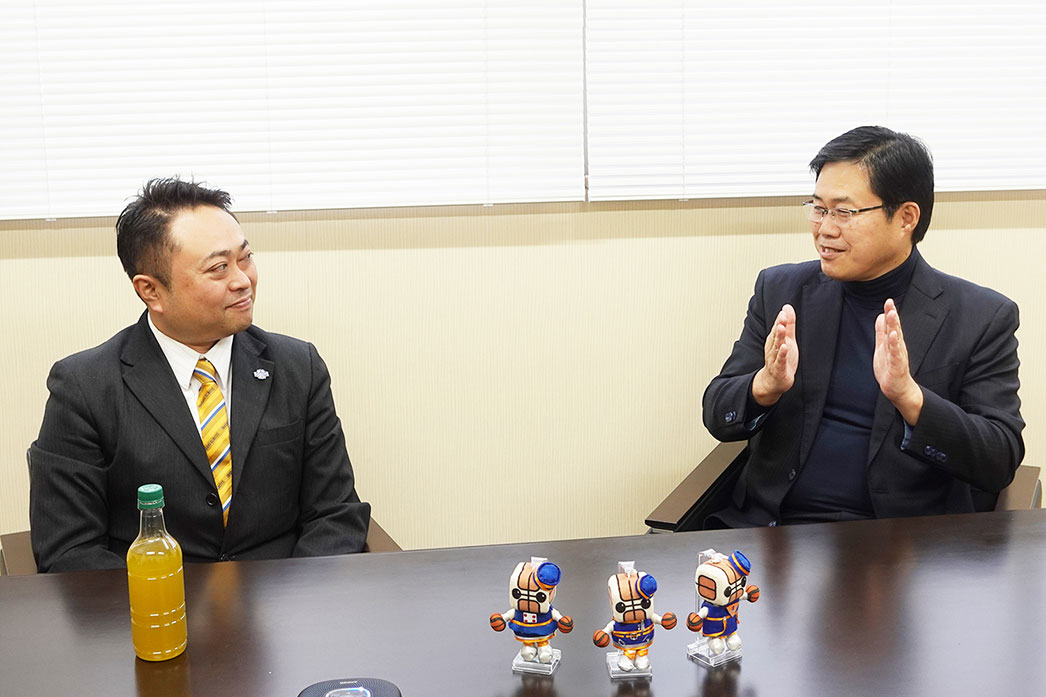
There is much to learn from teamwork
--The Tsukuba Research Center has also been operating in Tsukuba for a long time.
ICHIYAMA: We have been based in Tsukuba for about 40 years. We originally opened a hydraulic experiment station on a site of about 1 hectare in the suburbs of Maebashi City, Gunma Prefecture in 1974, and moved to our current location as the "Tsukuba Experiment Station" in December 1984. Currently, we have both outdoor and indoor full-scale hydraulic experiment stations, and a total of about 50 engineers and technical staff are engaged in hydraulic experiments, experimental study, analysis, basic research that forms the basis of investigations and plans, and joint research with other universities and research institutes. However, even though we have been here for a long time, our ties with the local community are not strong. In the past, we held the "Tsukuba Festival," inviting employees' families and neighbors, but it is currently suspended. Originally, our job as consultants is to mainly develop social infrastructure to make the lives of local people more comfortable, safe and secure, and the development of the local community is our social mission. I was thinking about getting more involved in the local community through my main business and various social activities outside of my main business, and it was at that time that I encountered Ibaraki Robots.
KAWASAKI: There were some very enthusiastic fans within the company.
ICHIYAMA: It just so happened that there was someone at Headquarters who liked basketball and was a big fan of the Ibaraki Robots. In fact, I was invited to watch a game with him/her. That was the first time I saw it in live, and even though it was an indoor sport, it was very exciting and entertaining. I thought it would be great to become an official sponsor of the Ibaraki Robots and contribute to the local community together. PACIFIC CONSULTANTS' headquarters has sponsored them before, but this time I wrote the request myself and became an official sponsor from the 2021-2022 season.
KAWASAKI: I was happy that PACIFIC CONSULTANTS joined us as a sponsor. When we first met PACIFIC CONSULTANTS, the Robots were in their second year in the B.League and were a second division team. We were in a situation where we could get around 1,000 people to come and watch each game. However, from the second season, with the support of your company, we were able to start offering free invitations to elementary and junior high school students in the prefecture who were registered as players with the Ibaraki Basketball Association. It's called the "Player's Pass" and allows you to watch 30 home games a year for free. This is a big foundation that continues to this day. They became fans after watching that game, and still come to watch games today. It's one of the driving forces that has allowed the Ibaraki Robots to grow to this point, attracting 1,000 spectators.
ICHIYAMA: We have gained a lot from being sponsors. When we go to the arena, it's not just the fun of cheering together in the stands, but also the fact that the players and staff are united in supporting the team. The hard work of the staff, the sense of unity as a team, and their engagement were very attractive. Since becoming an official sponsor, we have realized that supporting the Ibaraki Robots means being part of the community, and it has led to an increase in our sense of unity and camaraderie as a company. Not only at work, but also near my home, when I was wearing the Robots shirt and participating in a cleaning activity in the neighborhood, I had a lively conversation and asked, "What is that?" That was the trigger for that person to become a big fan of the Ibaraki Robots, and now I'm a platinum member (laughs).
KAWASAKI: It's nice. I've heard from sponsoring companies that they feel proud to see their company name displayed at the arena, and that their families talk about how their dad's company is performing. I also often hear stories of families going to games together and having more conversations.
ICHIYAMA: That is certainly true.
KAWASAKI: Just like the encounters with neighbors mentioned earlier, sports can be a tool for communication at home, work, and in the community, allowing people to share their joys, sorrows, anger, sorrows, and happiness. I think this is a power that only sports can have.
Becoming a force that connects people, towns, and business operators
--What kind of activities are you doing together now?
KAWASAKI: We are doing various community contribution activities with PACIFIC CONSULTANTS. Originally, Ibaraki Robots thought that sponsorship was not something that the sponsoring company would give money to and then we would do our best. I think it should be "Let's work hard together for this community" rather than "We'll support you. Do your best." Now, we are working on a community contribution activity called "M-HOPE ~Hope of Everyone~" with our sponsoring companies. Our players visit elementary schools, kindergartens, nursery schools, child welfare facilities and welfare facilities, and donate basketball goals and basketballs to schools and facilities. As part of this, we are supported by PACIFIC CONSULTANTS to invite children from special needs-support schools and child welfare facilities to watch the games. We used to invite them in the past, but because of the burden of the staff's chaperones and transportation, we could only get a limited number of people to come, so we asked PACIFIC CONSULTANTS to arrange a large chartered bus to the arena. The bus goes around to each facility in turn, so we were able to invite 45 people at once. They also provided us with mini megaphones to use for cheering.
ICHIYAMA: I thought it would be nice to have a megaphone because it would be a good idea to display it at home after watching the game and it would be a good conversation starter, like "Did you go to watch it?" On the day, we, the employees, also participated, and we were moved and energized to see the children having such a good time. I feel like we have been given the opportunity to realize various things.
KAWASAKI: I think the role of a local professional sports team is to "connect." If the Ibaraki Robots can become a common topic of conversation and connect people of all ages and people with disabilities, or the community and businesses, or the community and schools, I think that will help further develop the identity of Ibaraki.
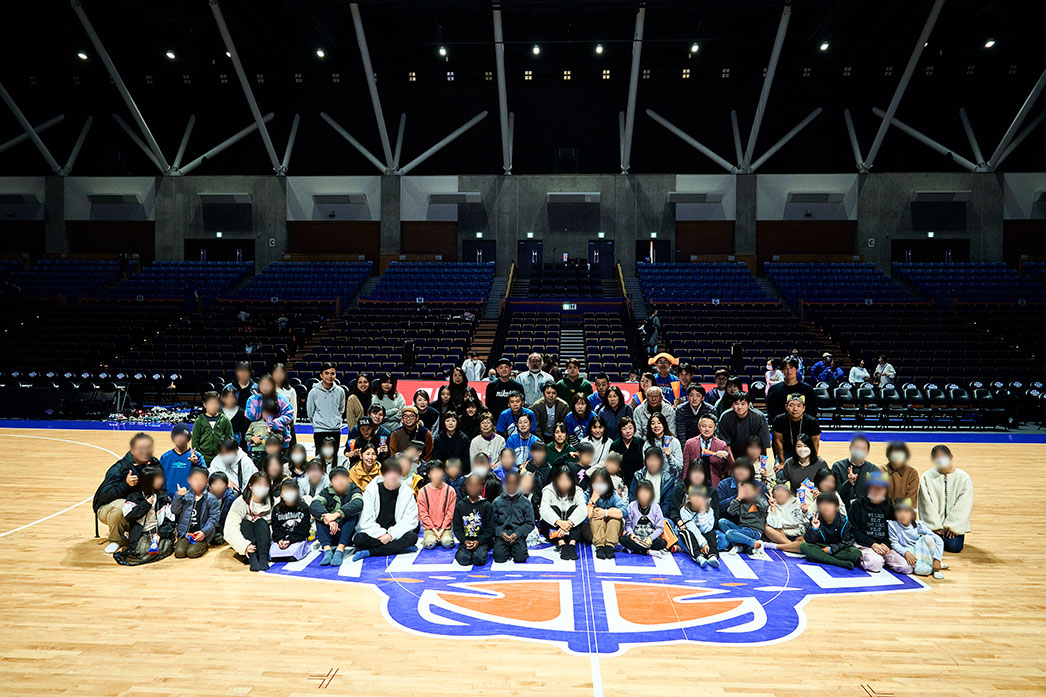
(Ibaraki Robots Press Release)
I want to proudly say, "I'm from Ibaraki"
--What kind of developments do you envision going forward?
KAWASAKI: Thanks to you, we were able to obtain the B Premier license, and from the 2026-27 season, we will be competing on a new stage. When the Ibaraki Robots were promoted to B1, we declared that we would be the best in Japan in 10 years. 2031 will be our 10th year, so our first big mission is to fulfill that promise. If we become number one in Japan, I'm sure the hidden Ibaraki people scattered all over Japan will proudly say, "I'm from Ibaraki," in their Ibaraki dialect, raising their intonation at the end of their sentences. In Kansai and other places, when asked "Where are you from?", there are quite a lot of people who answer "Kanto" or "near Tokyo." I'm from Ibaraki, so I understand how they feel. I want to change that with the power of the Ibaraki Robots. I think the next two or three years will be the deciding factor.
ICHIYAMA: I think our company is also at a major turning point. Technically, we need to introduce and utilize AI and various IT tools for social infrastructure development, and we need to change the way we work, but more than that, we need to consider how to utilize people's power and how to bring out the best performance as a team. What is needed in these difficult times when we cannot see the future is people's power and an organization that can bring out that power. Our vision is to "discover social issues that change with the times and future social issues, and solve them with advanced services centered on infrastructure engineering." In order to find future social issues faster than anyone else and take the lead in solving them, it is important that members can demonstrate their best abilities. Seeing the Ibaraki Robots' players and staff working together to win at their games makes us want to learn more. Because we need an organization where each individual's individuality is respected and their power can be united. In that sense, we would like to increase the number of Ibaraki Robots fans not only within the company but also in the local area, and increase the power of the organization and the local area.
KAWASAKI: Thank you. We are now in an age where we really need to harness the potential of each and every individual.
Let's continue to take on new challenges together.



